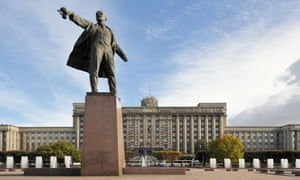
‘Lenin would very likely have identified 2017 as a revolutionary moment.’ A monument to Lenin in St Petersburg, Russia. Photograph: fordeno/Getty Images/iStockphoto
Stephen Bannon, President Trump’s chief political strategist and, after Trump, the most powerful man in Washington, once declared proudly: “I am a Leninist.” He was talking to a New York university academic who had written extensively on communism and the former Soviet Union. “What on earth do you mean?” the professor asked him. “Lenin wanted to destroy the state and that’s my goal too,” replied Bannon. “I want to bring everything crashing down and destroy all of today’s establishment.”
Two days after Lenin seized power in Russia almost exactly a century ago, he began an assault on the press – and his successors in the USSR did not let up for the next 70 years. In the few months between the overthrow of the tsar and Lenin taking power, a relatively free press had sprung up, almost all of it vigorously opposed to Lenin, who was written off as a dangerous demagogue. When his Bolshevik party mounted a successful coup and Lenin made himself, in effect, dictator of Russia, one of his first acts was to censor the press, which he called “a weapon no less dangerous than bombs or guns aimed at us … Why should we place it in our enemies’ hands?”
Three days after Donald Trump’s inauguration Bannon told the New York Times: “The media should be embarrassed and humiliated and keep its mouth shut and just listen … I want you to quote this. The media here is the opposition party. They do not understand this country.”
Kellyanne Conway’s “alternative facts” are not entirely different from the “objective truth … the greater truth” that Lenin used to call for in the USSR’s state-run newspapers. If Twitter had been around then, he would very likely have used it. Lenin was brilliant at producing a pithy phrase to explain a complex problem so that anybody could understand.
No one should directly compare Lenin’s seizure of power in a military coup in 1917 with the populist insurgency that has swept through America and elsewhere in the west through the democratic process. And the lies the communists told for decades are different from Bannon’s or Trump’s. But much of Lenin’s political style and strategy can be adapted to present conditions. He depended on constant conflict and drama. He deliberately used shock tactics. He was nearly always domineering, abusive and combative, and often downright vicious. He battered opponents into submission with the deliberate use of violent language, not because he was personally vicious – he wasn’t – but as a technique “calculated to evoke hatred, aversion, contempt … not to convince, not to correct the mistakes of the opponent but to destroy him, to wipe him and his organisation off the face of the earth”.
Breitbart, the website Bannon created, and the hate-filled language of alt-right politics, are decidedly Leninist in tone. Above all, Lenin needed to invent enemies he had to be seen to defeat. In post- revolutionary Russia it was the kulaks – richer farmers who were “sucking the blood” of poorer peasants, bankers who were war profiteering, the “elite” (a word Lenin used frequently) who treated the majority with contempt. He despised so-called “experts” who claimed a monopoly of knowledge. He often said that a worker with five days’ training could run a government department. He scapegoated opponents and labelled them “enemies of the people”.
Lenin abolished the existing legal system and started afresh. Within a few weeks his regime closed down the first freely elected parliament in Russia’s history – and the Soviets never allowed another one. It would be wrong to assume that the next step for Trump is the abolition of Congress, or the construction of labour camps. But the unprecedented war by tweet between the administration and the judiciary over the president’s executive order on immigration has real echoes of Bannon’s revolutionary hero.
Lenin would very likely have identified 2017 as a revolutionary moment. He matters today not because of his flawed and bloody answers, but because he was asking questions similar to those we are asking today. In his quest for power, Lenin promised people anything and everything. He offered simple solutions to complex issues. He lied unashamedly. He justified himself on the basis that winning meant everything; the ends justified the means. Lenin was the godfather of post-truth politics. Powerful people have learned depressing lessons from him.
